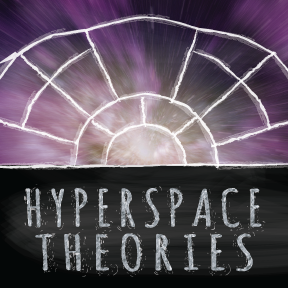Hyperspace Theories Episode Two: The Legacy of George Lucas
For our second episode of Hyperspace Theories, Megan Crouse joins Tricia, B.J., and Kay for our storytelling and speculation discussion.
In the first segment, we continue our examination of the foundations of Star Wars storytelling with the fundamental ideas provided by The Maker himself: George Lucas. Although he has retired from Lucasfilm and creating more Star Wars stories, many of his ideas undoubtedly will strongly influence the creation of the Sequel Trilogy and all the other tales coming in the future of Star Wars. Our discussion ranges from the themes and story arcs in the Original Trilogy and Prequel Trilogy films to The Clone Wars and Lucas’ insistence that a love story be included in The Force Unleashed videogame. Recently Lucas gave a short interview to Charlie Rose, where Star Wars as mythic storytelling came up:
We also talk about George Lucas’ longstanding ideas about what the story of the Sequel Trilogy might involve. The following quotes structure much of our conversation:
The main theme of the trilogy would be moral and philosophical problems, such as the necessity for moral choices and the wisdom needed to distinguish right from wrong, justice, confrontation, and passing on what you have learned. (via Wikipedia, citing a 1983 TIME magazine article and a 1989 Atlantic Monthly article)
“Eventually you have to face the fact that good and evil aren’t that clear-cut and the real issue is trying to understand the difference” (from 1983, via F.J. DeSanto)
“You’ll just be like a cameo. You’ll be like Obi-Wan handing the lightsaber down to the next new hope.” Lucas to Mark Hamill in 1976 (via J.W. Rinzler StarWars.com blog post, Oct. 30, 2012)
What remains unclear to fans at this point is the extent to which Lucas’ ideas remain at the core of Episode VII’s story. The first script for Episode VII was written by Michael Arndt from a treatment by George Lucas. In October 2013, Lucasfilm announced J.J. Abrams and Lawrence Kasdan as the film’s new screenwriters. Some indications point to a continuing strong influence of the first draft in the new script, but other rumors raise doubts.
Among the rumors floating around the internet about Episode VII are those based on a set of about two dozen concept art images from the movie leaked by someone with access to the production. We talk about two of those pieces through the lens of storytelling: the art with character designs for Chewbacca, which reveals that the storytellers were considering several different possible angles for his Episode VII appearance, and another image showing several characters and a single illuminated lightsaber, which is open to a variety of interpretations about its meaning. For fans who want to really dig into rumors, we recommend Club Jade, where the word on the street is always up to date, filtered through a reasonable lens and peppered with just enough snark to maintain perspective.
This episode’s Hyperspace Calculations segment on world-building considers another necessary choice the Star Wars storytellers must have made: the politics of the Star Wars galaxy thirty years after ROTJ. Here we primarily speculate, because so little has been rumored from the film so far. A number of possibilities exist, including a strong central government, a weak central government, a cold war between powerful rivals, or a fragmented political structure with no dominant faction. One possible clue, perhaps, comes from remarks by longtime Star Wars concept artists Doug Chiang and Ian McCaig at Celebration Europe in July 2013. They analogized their work on Episode VII to Europe’s “dark ages” after the fall of the Roman Empire. Although we’ve seen no official confirmation of this description, it does line up with many of the existing rumors.
One of the exciting possibilities for Episode VII is to connect themes and ideas from both the Original and Prequel Trilogies. For our Storytelling segment, we consider Star Wars Rebels as a first look at how Lucasfilm is approaching that dynamic. At the same time, Rebels also challenges our expectations, such as using Kanan to show that not all of the Jedi were wiped out in Order 66.
As usual, we conclude with our Plot Bunny Giveaway, also featuring Rebels.
Tricia is @FANgirlcantina on Twitter, as well as posting at FANgirl Zone on Facebook and on Tumblr.
Kay tweets @Geek_Kay.
You can follow Megan Crouse on Twitter and at her blog This Blog Is Full of Words.
- Hyperspace Theories: Bad Luck Ghorman - June 2, 2025
- Hyperspace Theories: One Year Later as ANDOR Kicks Off Season Two - May 15, 2025
- REVIEW: Tales of the Underworld - May 4, 2025












Pingback:Hyperspace Theories Episode 11: Disney Influences, Shifting Scripts, and the Star Wars Everyman « FANgirl Blog